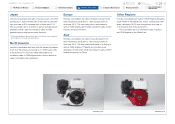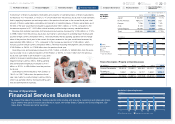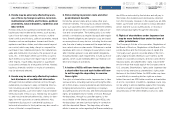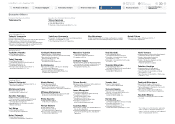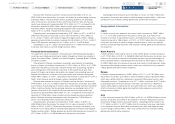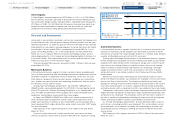Honda 2014 Annual Report Download - page 27
Download and view the complete annual report
Please find page 27 of the 2014 Honda annual report below. You can navigate through the pages in the report by either clicking on the pages listed below, or by using the keyword search tool below to find specific information within the annual report.
9. Because of daily price range limitations
under Japanese stock exchange rules, a
holder of ADSs may not be able to sell
his/her shares of the Company’s common
stock at a particular price on any particular
trading day, or at all
Stock prices on Japanese stock exchanges are deter-
mined on a real-time basis by the equilibrium between
bids and offers. These exchanges are order-driven mar-
kets without specialists or market makers to guide price
formation. To prevent excessive volatility, these
exchanges set daily upward and downward price fluc-
tuation limits for each stock, based on the previous
day’s closing price. Although transactions may continue
at the upward or downward limit price if the limit price is
reached on a particular trading day, no transactions may
take place outside these limits. Consequently, an inves-
tor wishing to sell at a price above or below the relevant
daily limit may not be able to sell his or her shares at
such price on a particular trading day, or at all.
10. U.S. investors may have difficulty in serving
process or enforcing a judgment against the
Company or its directors, executive officers
or corporate auditors
The Company is a limited liability, joint stock corporation
incorporated under the laws of Japan. Most of its direc-
tors, executive officers and corporate auditors reside in
Japan. All or substantially all of the Company’s assets
and the assets of these persons are located in Japan
and elsewhere outside the United States. It may not be
possible, therefore, for U.S. investors to effect service of
process within the United States upon the Company or
these persons or to enforce against the Company or
these persons judgments obtained in U.S. Courts predi-
cated upon the civil liability provisions of the Federal
securities laws of the United States. There is doubt as
to the enforceability in Japan, in original actions or in
actions for enforcement of judgment of U.S. courts, of
liabilities predicated solely upon the federal securities
laws of the United States.
11. The Company’s shareholders of record on a
record date may not receive the dividend
they anticipate
The customary dividend payout practice and relevant
regulatory regime of publicly listed companies in Japan
may differ from that followed in foreign markets. The
Company’s dividend payout practice is no exception.
While the Company may announce forecasts of year-
end and quarterly dividends prior to the record date,
these forecasts are not legally binding. The actual pay-
ment of year-end dividends requires a resolution of the
Company’s shareholders. If the shareholders adopt
such a resolution, the year-end dividend payment is
made to shareholders as of the applicable record date,
which is currently specified as March 31 by the Com-
pany’s Articles of Incorporation. However, such a reso-
lution of the shareholders is usually made at an ordinary
general meeting of shareholders held in June. The pay-
ment of quarterly dividends requires a resolution of the
Company’s Board of Directors. If the board adopts such
a resolution, the dividend payment is made to share-
holders as of the applicable record dates, which are
currently specified as June 30, September 30 and
December 31 by the Articles of Incorporation. However,
the board usually does not adopt a resolution with
respect to a quarterly dividend until after the respective
record dates.
Shareholders of record as of an applicable record
date may sell shares after the record date in anticipation
of receiving a certain dividend payment based on the
previously announced forecasts. However, since these
forecasts are not legally binding and resolutions to pay
dividends are usually not adopted until after the record
date, our shareholders of record on record dates for
year-end and quarterly dividends may not receive the
dividend they anticipate.
Honda Motor Co., Ltd. Annual Report 2014 26
5 Corporate Governance
1 The Power of Dreams
2 Financial Highlights
3 To Our Shareholders
4 Review of Operations
6 Financial Section
7
Investor Relations
Information
Return to last
page opened
Go to
contents page







